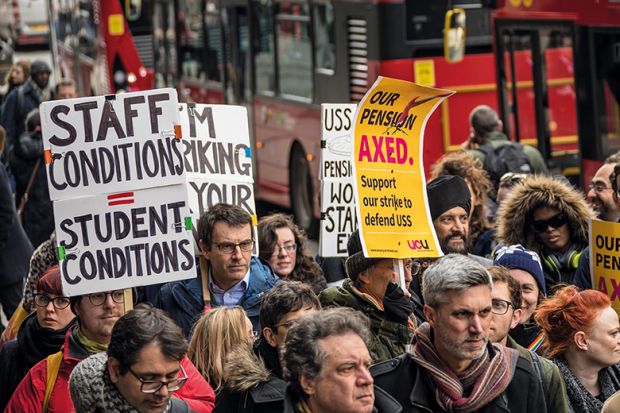UK universities are making preparations to reset examinations and assessments in light of disruption caused by the pensions strikes, Times Higher Education has learned.
More than 1 million students are believed to have been affected and more than 575,000 teaching hours lost during 14 days of escalating industrial action at 65 universities.
This week academics were considering a fresh offer to end the dispute over the future of the Universities Superannuation Scheme. If no deal can be struck, more strikes will follow.
A spokeswoman for the University of Cambridge said that guidance had been issued to heads of department, who would consult with examiners and decide if amendments to examinations might be appropriate to reflect lost teaching time.
Possible changes include removing questions on material that has not been taught and replacing them with others on topics that have; setting more or fewer questions, or removing restrictions on compulsory questions; and shortening a paper from the standard three hours and requiring fewer questions to be answered.
“These discussions have occurred or are occurring now. In most cases, no change to assessment will be required,” the spokeswoman said. “The university will not be reducing the pass mark or amending classing boundaries, since this will undermine the integrity of the examination process.”
Several institutions, including the universities of Surrey and Warwick and Lancaster University, said that they would be reviewing the content of assessments to ensure that it did not include material that had not been covered in class.
“If the delivery of a module or the content contained in an assessment is affected by the strike action, this will be taken into account, where appropriate, when the work is marked,” a Lancaster spokeswoman said.
A spokeswoman for the University of Reading said that a process had been set up to allow students to make a case for extenuating circumstances if they feel that their education has been adversely affected by the strikes.
“Mitigating action includes extensions to coursework and dissertation deadlines, rescheduling of missed in-class tests, removal of an element of assessment from the overall assessment of the module, or a change in the markers’ expectations for the affected piece of work,” the spokeswoman said.
The University of Oxford was the only institution that told THE that it would not amend assessments in light of the strikes.
“We expect all examinations to take place as scheduled, and will put plans in place to ensure that they go ahead if necessary,” a spokesman said.
Meanwhile, more than 600 external examiners have responded to a call from the University and College Union for them to resign from positions at universities affected by the strike. External examiners have a role in setting questions, moderating results and ensuring the quality of marking procedures.




